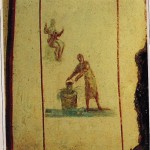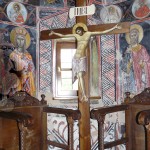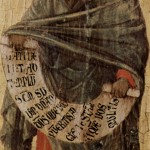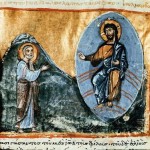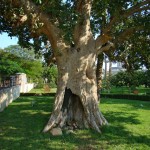
What follows is a sermon that I preached on Pentecost Sunday. I used Acts 2:1-21 and Ezekiel 37:1-14 as my texts.
When I was a kid, I lived about fifteen miles from the world headquarters of the R.J. Reynolds Tobacco Company. My grandfather worked at one of their plants, and my uncle worked at one of their plants and still does, and many of my friends had parents who worked for R.J. Reynolds. It was one of the best jobs you could get in our small town. I remember distinctly being in the first grade and noticing in September that many of my classmates were absent from school for a week or two at a time; and they came back bearing the reason for their absences, their excused absences in my small tobacco town: they had been absent because they had been at work in their families’ tobacco fields, doing the priming of the leaves, because their families needed their labor. Many of them developed nausea and vomiting, and later addictions from the nicotine seeping into their hands from the tar that came from the maturing tobacco plants.
I can’t overemphasize to you how enmeshed my hometown was with tobacco. My high school was the last one in the state, a state which was no doubt one of the last states in the nation, to still allow students, high school students, a smoking area and designated smoking breaks from class. This was in the 90s. My church, I remember, my church, underwent its greatest conflict when we voted on whether to ban smoking inside the building. The church elders were all tobacco farmers. The Sunday School teachers were plant workers. Even those of us who didn’t have direct ties to the industry knew where the tax revenues came from. Tobacco was king over all.
I was back home last week. Iliff sent me to give a lecture, of all places, in Stoneville NC, just twelve miles from my little hometown. It was a retreat for college students who were considering going to seminary; I’ll get back to them in a moment. But this retreat was held in the next county over from mine, and so I drove down all those old familiar roads back home and through all those places I’ve known so well. The roads there are lined with tobacco fields; the roads go right through tobacco fields. Those fields stretch for acres and acres, deep green and waist-high, big broad leaves looking like the healthiest thing in the world. Or at least, that’s how I remembered those fields. At least that’s what those fields looked like when I left for college twenty years ago.
Now, those fields are full of soybeans. They’re full of soybeans, and sometimes corn, and sometimes alfalfa. In the twenty years since I left town, the tobacco industry has collapsed. Smoking bans, and surgeon generals’ warnings, and nicotine patches, have all conspired to bring the industry down from its historic heights. And what tobacco people do still smoke can be grown more cheaply in China, or Egypt, or somewhere closer to the “emerging markets.” So those fields are now a lighter shade of green, soybean green, and the plants reach to your ankle, not your waist. And the giant processing facility down the road from my house is still running, but it’s mostly empty, its parking lot holding a half-dozen cars in its thousands of parking spaces.
And now is a good time to declare my biases: I HATE cigarette smoke. I can’t even stand to drive behind a car where someone is smoking; just catching a whiff makes me angry. But I feel this sense of loss that I cannot completely understand in the loss of the tobacco industry. It was a way of life. It was a destructive, murderous way of life for many people, built on lies and propped up by junk science and junkier politics. But it was a way of life, and it’s what I knew, and now that it’s gone I mourn it. I know the people who were laid off, who were forced off their land, who are now making ends meet with soybeans and alfalfa at a fraction of the yield per acre that tobacco once brought. Every time I drive through I think about it, I mourn it.
So I drove through those fields and past those idle processing plants last week, and I made it to this retreat where young people were discerning whether they were called to ministry. And I had been invited to give a lecture titled “The Future of Faith and a New Kind of Christianity.” My job was to go to this retreat and stand up in front of these college juniors and seniors and tell them that they were not making a terrible life choice. I was supposed to convince them that there IS a future of faith, that there CAN BE a new kind of Christianity. I was supposed to tell them all the ways the church is changing, the ways it is alive, the ways it is looking to the future, a Pentecost message if you will. And that’s what I did. And I think I was pretty inspiring, if I do say so myself. But there’s something implied, isn’t there, there’s something implied in the fact that they have to invite someone to give that talk? There’s something implied in taking a moment out of a retreat designed for people entering a line of work, taking a moment out to say, “don’t worry about what you hear, we are pretty sure we’ll still be around by the time you retire.” That “pretty sure” implies that you’re not really sure. It implies some doubt. I wonder if those college kids drove to that retreat through all those converted fields and wondered if they were signing up for a lifetime of planting tobacco in a soybean world.
I know I wonder sometimes. The day before I gave that talk to those college students, the Pew Research Center published a new study. Now for those of us in ministry, seeing a new study from the Pew Research Center is the equivalent of a tobacco industry executive waking up in the morning to see a new advisory from the surgeon general. You know it’s not going to be a good day. You know it’s not going to be good news. You know it’s not going to say anything comforting. We kind of brace ourselves as we click the link to read it. We steel ourselves for how bad it’s going to be.
It was bad. Christianity is declining, still. Especially Protestant Christianity. Especially mainline Protestant Christianity–that’s us–especially we are declining. 3.4% decline for mainline protestants, since 2007, almost 8 percent for Christianity in general, 8 percent decline since 2007. Since 2007! That, my friends, is the year I moved to Denver and started working at this church, it wasn’t that long ago. 8 percent in 7 years. Those are tobacco numbers. That is a startling drop in market share, to use the language of business. That is a cultural shift, that is a broad-based rejection, that is an abandonment en masse, a sign that people consider the product tainted and unworthy of their investment. It feels sometimes, at least to me, it feels looking around Christianity today the same way it feels driving past those tobacco fields back home. There is a sense of something lost, of something irrevocably changed, of some golden age slipped into the past.
Now I had a dilemma while writing this sermon. I realized that, by starting with the story of the tobacco industry in the town where I’m from, that I would lock myself into comparing Christianity, comparing the church, to tobacco. And that is not a flattering comparison. Tobacco is a poisonous product, it’s a drug, a marvel of chemistry and marketing that seduced many people to their deaths. I had a dilemma while writing this sermon because I didn’t want to go down the path of telling that story about the church, I didn’t want to make that comparison.
But then I asked: why shouldn’t we go down that path? And why shouldn’t the church get compared to the tobacco industry? The church, after all, has been, at times, a deeply unethical institution, dealing in lies and misleading rhetoric and coercive marketing. It has made its profits by the dehumanization of certain kinds of people. The church has very often sold a poisonous product, as many of you here today can testify; the church has peddled ideologies of sexism and racism and homophobia and hate and guilt and shame. So why not compare it to the tobacco industry, why not tell the truth, and say that the church has not always lived up to its calling and to its own ideals? Why not take the opportunity to acknowledge the past and move into the future?
Here’s where I think we have a Pentecost message. Here’s where I think we have something to say. Here’s where I think scripture can speak to our current circumstances. Because what we see in the bible, again and again, what we see in the stories of the people of God, what we see is that again and again life comes out of places of deepest darkness. It is when the people of God have come up against the harshest realities, it is when the old ways have ended in desperation and defeat, it is when all else has failed, that the new can rush in.
“Can these bones live?” What a desolate scene are those words spoken into. “Can these bones live,” as we look upon a whole valley of very dry bones. “Can these bones live,” as they crunch underfoot, the remnants of lives that once were. “Can these bones live?” What a strange question. Of course they cannot live. They are bones. Maybe they could become part of the soil and feed new life that way. Maybe they could live on in that sense. But bones can’t live. They’re bones. Very dry bones. This is a scene of what it looks like at the end, when everything has failed. And all that was left was dry bones.
Or how about this story of defeat and darkness. They were all together in one place, in Acts chapter 2, and their hopes were dashed, their expectations were stymied, their friend and their leader was dead…they had seen him die. And they were afraid. And they were huddled together, the last of them, in fear. And in the harshest moments of their confusion and defeat a rush of wind filled the room and divided tongues as of fire rested on their heads and they were suddenly filled with the Spirit of God.
And on those dry bones—lest we forget that God has been about this work for a long, long time—on those dry bones way back there in the book of Ezekiel, on those dry bones there formed flesh, and into that flesh there flew breath, and though the text doesn’t say so, I can only assume that that breath then flew out in songs and great shouts of joy. And that’s what happened on that day of Pentecost, there in the book of Acts, that wind that rushed in rushed out again in miraculous language and confident words and in the workings of the Spirit of God.
You see, God never fails to bring forth life. But God does not always bring forth life from our death-dealing ways. God does not, as far as I can tell, sanction institutions and traditions because they have always existed, as if the Spirit of God were some kind of birthright of the dying. No, God seems, as far as I can tell, to find those places where death is most near, where death is accomplished, where the old has passed away and left only traces, where something new can truly flourish. God is a student of the new, God is the breath of life, and the lifegiving power of God is not bound by the dryness of our bones. God is in the business of life.
I drove back through my old hometown, having given my talk on the future of faith and a new kind of Christianity. I drove past those fields of soybeans, that had once been so full of tobacco, and I saw toiling in those fields women and men who hoped to make their lives from that soil. Maybe they remembered the tobacco, or maybe they only knew the soybeans, but all the same there they were striving to bring life forth from it. I thought, as I drove, about those young women and men at that retreat who were deciding whether to bet their lives on the church—or at least, to bet their lives on God—to ignore all the data and do the thing they heard God calling them to do. I had told them that their churches wouldn’t look like mine, with a big steeple and an educational wing and a large parking lot, that they would find life and ministry in many different places that might not look anything like the churches we have know for so long. That much is for certain—the parking lots of big-steeple churches are as empty as the parking lots of the tobacco plants.
But here’s the thing. I bet the parking lots at the soybean plants are full. And I bet people are making ways of life out of that. And I bet people are finding life in what’s next—far more life than that old death-dealing tobacco leaf ever brought. And I realized, driving down those roads out of town, that my nostalgia for the old days of tobacco was just that—nostalgia. I was grieving for a thing I don’t even believe in. I realized that I’m glad it’s gone. Less tobacco in the world is a good thing. And I realized that if those college students could go out into the world and find God putting flesh onto dry bones, if they could go out into the world and see God breathe spirit into people in whole new ways, if those young people could make a life in the church that God is breathing into life tomorrow—then our nostalgia for the way the church was can fade away. Then our longing for the good old days that weren’t always that good, to everyone, can pass away. Then it’s not a question of indulging our grief and nostalgia for what we’ve always known. Then it’s a call to go out into the fields and see what’s growing next. Can these bones live? Let’s go and see. Amen.

